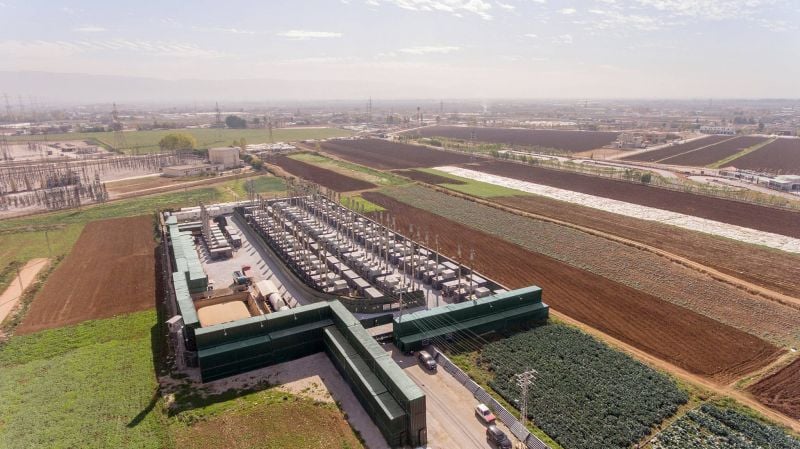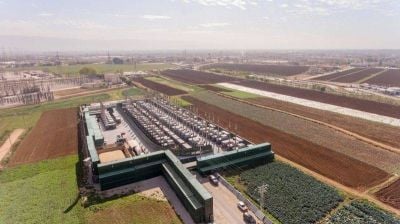
The Électricité de Zahlé plant powers the area when state electricity turns off. (Credit: EDZ)
ZAHLE — For years, Électricité de Zahlé has been touted as a rare success story in Lebanon’s energy sector.
Even now, amid a spiraling currency crisis and fuel shortages, while residents throughout Lebanon have been enduring increasingly lengthy shutoffs of not only state power provided by Électricité du Liban but also backup generators, residents of Zahle and 16 surrounding villages served by EDZ are still receiving 24/7 electricity — for now.
But the current crisis has exposed the fragility of EDZ’s model, which relies on both discounted power provided by EDL and subsidized diesel fuel imports to run EDZ’s own power plant.
Both of those are now in short supply.
“Around 300,000 people are living in this area, and they don’t have another power source — there are no more [residential] generators in Zahle — so the target is to keep it 24 hours,” Naji Jreissati, EDZ’s deputy general manager, told L’Orient Today.
But he and other company officials acknowledged that this may not be possible. The company has developed a power rationing plan, Jreissati said, which would start with cuts to industrial users that still have their own backup power generators to preserve around-the-clock electricity for as long as possible for residential consumers who have no alternative.
“If you do not have fuel for the country, you cannot keep the power supply 24 hours,” Nicolas Saba, the director of the company’s technical department, said. “We cannot do magic.”
Where does EDZ fit in Lebanon’s energy landscape?
Even before the economic crisis began accelerating in late 2019, EDL was providing only about 60 percent of the country’s electricity, with the gap being filled primarily by a vast network of private diesel generators.
The entire private generator industry is technically illegal, because the generator owners are not licensed by the state to sell electricity. But with EDL unable to meet the country’s full demand or even to cover the cost of the power it is producing with the tariffs it collects, authorities have largely turned a blind eye.
Before 2014, the situation in Zahle was similar to that of the rest of the country. While EDZ had been in business since 1923, it had ceased power production for many years and was functioning essentially as a distributor for EDL, with residents relying on generators when the state power cut.
But in 2014, the company sprang into the national spotlight when it struck a deal with Aggreko, a British company specializing in temporary power supplies, to set up its own diesel-based generation plant in Zahle. After a political battle, the company managed to dislodge the network of private generator operators and become the sole power provider in Zahle.
In late 2018, EDZ’s long-term concession expired and was replaced by a two-year contract, which Parliament extended in December for two more years.
When EDL energy is available, EDZ buys it at a subsidized rate and distributes it to Zahle consumers. When the EDL power is shut off, EDZ produces its own power at the Aggreko plant. The Energy Ministry sets the tariffs it is allowed to charge for this power based on the price of diesel fuel and other operating costs.
Up until the crisis, the EDZ model worked relatively smoothly.
A recent working paper by a group of energy experts who assessed EDZ’s operations and whether its model should be replicated noted that EDZ “is profitable while providing electricity at an overall cost no higher than that paid by households reliant on private generators.” It added: “In a country plagued by power cuts, EDZ seems to have demonstrated a model of high-quality service provision and 24/7 electricity coverage.”
However, the paper critiqued EDZ’s reliance on subsidized energy provided by EDL, saying, “The ongoing economic crisis in Lebanon and the dire state of EDL raise questions about the validity and sustainability of the EDZ model.”
An Energy Ministry source pointed to some of the pitfalls.
“They are burning diesel oil, which is the most expensive fuel, and they are using the least-efficient generation technology, which is high-speed diesel engines, so as far as generation is concerned … this is not ideal,” he told L’Orient Today. “But their operation is efficient because they have a setup that is able to do 100 percent collection of the tariffs.”
By contrast, EDL collects only 60–70 percent of the bills in its coverage area, which has contributed to the utility’s massive annual deficits and, in turn, the overall government shortfall because the state has been covering annual shortfalls amounting to $1–2 billion.
EDZ’s operations, the Energy Ministry source said, are “sustainable as long as the consumers are able to pay their dues. … If this changes, I can assure you EDZ will not last two months.”
Along with its efficient bill collection operation, the company’s profitability also stems from receiving EDL electricity at a discounted rate. While customers in Zahle, as in the rest of the country, pay about LL125 per kilowatt-hour for EDL power — which is already well below the cost of production — EDZ returns to EDL only about LL88 per kilowatt-hour.
“In effect, this is a direct transfer of resources from the central government (which underwrites EDL’s losses) to EDZ,” the working group paper noted.
Even with this subsidy, the profitability of the Zahle model has eroded as EDL has cut back its production and EDZ has had to buy more diesel to feed its own power plant.
Before the crisis, Saba said, the plant burned about 120,000–130,000 liters of fuel a day. Now, with EDL’s power reduced, he said, “The daily consumption is around 180,000 liters per day, and because of the shortage of fuel in the country it is very, very hard to get this amount. … I am spending most of my time just trying to get the fuel, irrespective of its price.”
Apart from the cost of fuel, EDZ’s contract with Aggreko to maintain the plant is in US dollars, although Jreissati said that in light of the currency crisis, the company has been accepting part of the payment in so-called lollars, which can be converted to lira at a rate of LL3,900, considerably lower than the market exchange rate.
“Because we are good clients and it’s been six years we’re working together and we never had any issue with paying our bills, they are being a bit patient,” he said. “Until now they are accepting this, but for how long?”
Aggreko representatives did not respond to a request for comment.
The promise of renewable energy
Hundreds of EDZ’s customers have installed solar power systems, taking advantage of a “net metering” arrangement that allows them to get a discount on their power bill in exchange for feeding solar power into the grid. About 11 of the 70 megawatts on EDZ’s grid now come from renewable energy, Jreissati said.
Jessica Obeid, an independent energy analyst, told L’Orient Today that consumers in Zahle had been able to purchase solar systems relatively cheaply because of the availability of 24-hour electricity; they did not need to install batteries to store energy for when the regular power grid goes down.
“Batteries are expensive, so it was very affordable for them, compared to the rest of the population, to get solar energy, because they have electricity all the time,” she said.
However, if EDZ starts rationing power, she noted, those solar systems will not help customers during outages, because they are set up to work only while connected to the grid.
The company itself has not invested in large-scale solar production. Neil McCulloch and Marc Ayoub, two of the recent working paper’s authors, estimate in another forthcoming paper that EDZ could save $6–13 million a year if it invested in a 63-MW solar farm, mainly due to the reduction in diesel fuel costs.
Asked why EDZ has not put more resources into renewable energy projects, Jreissati pointed to the short term of the company’s contract with the government, which makes large investments financially risky.
He said the company had met with the Energy Ministry and EDL officials in 2019 to discuss a proposal for an industrial solar farm, but “they could not give any guarantee that we would stay operating the grid, so in the end it’s not viable.”
The Energy Ministry source said the contract had been approved in 2018 on a short-term basis because it had not gone through the usual public procurement process and because at the time, the ministry was hopeful that it would be able to build new power plants to improve EDL’s service provision.
“Had the projects progressed as they should have, two years was more than enough time to have 24-hour electricity over all of Lebanon,” he said. “Unfortunately, all of this political situation occurred, and the cabinet resigned, and none of the projects that we were preparing at that time were launched … so we reached the end of last year, and Parliament had to again renew this [contract] for another two years.”
Obeid said long-term licenses for EDZ and other power producers would be key to solving Lebanon’s energy issues.
“Nobody’s going to invest in a 25-year solar system if they do not have incentive and a consistent policy that the government is going to let this happen for 25 years,” she said. “If more of that model would have happened, we would have less of a crisis in electricity now.”
For now, Obeid said she expects the authorities to do all they can to preserve the subsidy on diesel fuel and prevent a complete collapse of the electric system. In the meantime, she said, “the government needs to be doing all it can to deploy decentralized generation, especially renewables, so that when we get to [the end of the subsidies], it won’t be catastrophic.”
Ayoub and McCulloch likewise recommended that the government should facilitate the creation of more regional utilities similar to EDZ, but with long-term contracts and other reforms.
“The argument that a fair concession model would be good for Lebanon is not a suggestion that the EDZ model should just be replicated as is, because the EDZ model as it is, is unfair,” McCulloch told L’Orient Today. “It extracts money from the center in a way that takes resources away from everybody else and gives it to one of the relatively better off places of the country.”
Still, he said, with some modifications, EDZ’s model could offer a path to improving Lebanon’s electricity sector without waiting for central government reforms that have stalled for decades; if given long-term contracts, such utilities could attract international investment in renewable energy projects.
“It is possible to set up a just regional utility model … in a way that would have effective regulation from the center without having to fix all of EDL’s problems,” McCulloch said.
